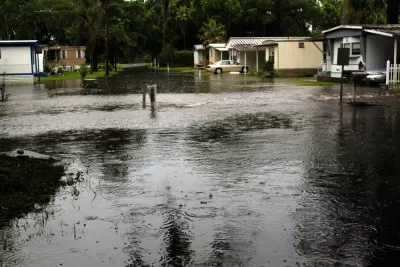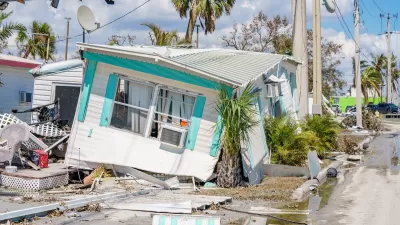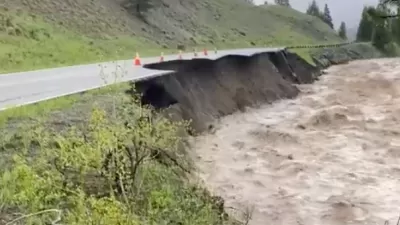A key supply of low-cost housing is under threat from extreme weather, rising sea levels, and other impacts of climate change.

Manufactured housing, often described as mobile homes (despite the high cost of relocation for these units), offers some of the most affordable housing in many parts of the country.
But with climate disasters posing growing threats to residential communities, manufactured home residents face some of the highest risks, writes Sarah Amandolare in Nexus Media News. “Across the U.S., biased zoning has sited many manufactured housing communities in precarious ‘fringe environments,’ such as floodplains and fire-prone urban edges, according to Zachary Lamb, a climate adaptation researcher at UC Berkeley.”
As Amandolare explains, climate change is now causing more destructive weather events in these areas, forcing communities to find ways to keep residents safe or relocate without raising the cost of living. A Vermont program in the Tri-Park Cooperative, a resident-owned mobile home community, could provide a new model for assisting homeowners with relocation. “Tri-Park residents each pay the same monthly rent to the co-op for their lot – an amount that won’t change for those who relocate – and the cost of their new homes will be covered by Vermont’s new Flood Resilient Communities Fund, rather than FEMA.” The program is administered by Vermont Emergency Management and was allocated $14.75 million by the state in 2022.
FULL STORY: Mobile Homes Offer Low-Cost Living. Now, They’re Threatened by Climate Change.

Trump Administration Could Effectively End Housing Voucher Program
Federal officials are eyeing major cuts to the Section 8 program that helps millions of low-income households pay rent.

Planetizen Federal Action Tracker
A weekly monitor of how Trump’s orders and actions are impacting planners and planning in America.

Ken Jennings Launches Transit Web Series
The Jeopardy champ wants you to ride public transit.

Opinion: Transit Agencies Must View Service Cuts as Last Resort
Reducing service could cripple transit systems by pushing more riders to consider car ownership, making future recovery even less certain.

‘Smart Surfaces’ Policy Guide Offers Advice for Building and Maintaining Urban Tree Canopies
Healthy, robust tree canopies can reduce the impacts of extreme heat and improve air quality.

New Jersey Lawsuit Targets Rent-Setting Algorithms
The state of New Jersey is taking legal action against landlords and companies that engage in what the state’s Attorney General alleges is illegal rent fixing.
Urban Design for Planners 1: Software Tools
This six-course series explores essential urban design concepts using open source software and equips planners with the tools they need to participate fully in the urban design process.
Planning for Universal Design
Learn the tools for implementing Universal Design in planning regulations.
Heyer Gruel & Associates PA
Ada County Highway District
Institute for Housing and Urban Development Studies (IHS)
City of Grandview
Harvard GSD Executive Education
Toledo-Lucas County Plan Commissions
Salt Lake City
NYU Wagner Graduate School of Public Service





























